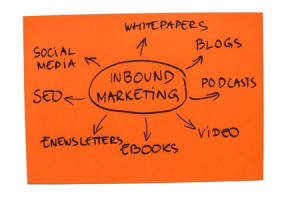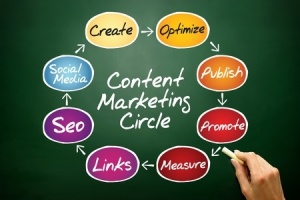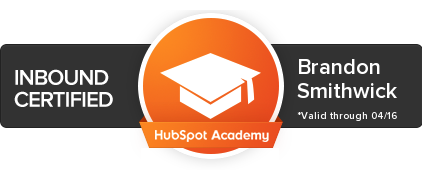What is Inbound Marketing?
 The marketing and sales channel has changed drastically in how we target our prospects. Many of us are familiar with cold calling and trying to gain the interest of those we contact. Inbound marketing is just the opposite. The sales leads come to you from a marketing activity you are currently using. This could be direct mail, website, e-mail marketing, social media, SEO or any other marketing activity you can think of. Your small business does not have to be a part of every channel but you do need to market in the respective channels that make sense for your business.
The marketing and sales channel has changed drastically in how we target our prospects. Many of us are familiar with cold calling and trying to gain the interest of those we contact. Inbound marketing is just the opposite. The sales leads come to you from a marketing activity you are currently using. This could be direct mail, website, e-mail marketing, social media, SEO or any other marketing activity you can think of. Your small business does not have to be a part of every channel but you do need to market in the respective channels that make sense for your business.
Content Marketing
Content Marketing is extremely powerful when marketing your business. Many will try the “sales’ approach with their content marketing. This is not the way to go about it anymore due to shifts  in how consumers receive advertisements. You need to create something of value. Give your prospect a reason to inquire more about what you are doing. TELL YOUR STORY. CONNECT WITH THEM. When you connect emotionally with your audience they will come to you asking for more. When your audience resonates with your message, at that point is when they will interact with your content by either sharing, commenting or maybe even follow you. Growing your online audience by creating unique and relevant content takes time, and that’s why some business also use 6 sheet advertising to promote their products and services outside. Many tend to focus on quantity rather than quality. Anyone can gain a large number audience however if your audience is not interacting with your content then what good is that doing for you or your business?
in how consumers receive advertisements. You need to create something of value. Give your prospect a reason to inquire more about what you are doing. TELL YOUR STORY. CONNECT WITH THEM. When you connect emotionally with your audience they will come to you asking for more. When your audience resonates with your message, at that point is when they will interact with your content by either sharing, commenting or maybe even follow you. Growing your online audience by creating unique and relevant content takes time, and that’s why some business also use 6 sheet advertising to promote their products and services outside. Many tend to focus on quantity rather than quality. Anyone can gain a large number audience however if your audience is not interacting with your content then what good is that doing for you or your business?
Search Engine Optimization (SEO)
Search Engine Optimization is the one piece of inbound marketing that most are familiar with. SEO is defined as using a variety of techniques that affect your website’s visibility in the search engines (this page will give you all the details). Often you will hear this referred to as “natural” or “organic” results. This is the unpaid portion of the Search Engine Results Page (SERP). Every search engine has different items it uses in their algorithm’s to determine where you show up and results can change multiple times a day. It is estimated Google for example uses over 200 different ranking factors but this is not absolute and can change frequently. To learn more check out the SEO Beginners Guide and the short 4 minute video below to see how SEO has evolved also be sure to click here to get a lot more information!
Search Engine Marketing (SEM)
Search Engine Marketing involves the use of an advertiser paying to appear within the search engine results pages. This is referred to as pay per click (PPC), cost per thousand impressions (CPM) and cost per click (CPC). Your ad will vary in terms of where it is placed on the page as it depends on the search engine platform you are advertising on as well as how much you are willing to place a bid for. Advertisers compete against one another for the top placement. The higher the bid the higher your ad will be display on the page.
Social Media Marketing (SMM)
Social media is a great way for a company or individual to engage with their audience in real-time. Engaging with your audience can help contribute a higher ROI. Customers take notice to those brands or individuals that actively handle situations. With social media being an on the spot platform it is very simple for someone to start spreading negativity about your brand instantly. Most are familiar with the big platforms like Facebook, Twitter, Instagram, Google+ and Pinterest. There are many more but you do not need to be active on all of them. You do however need to be active where your audience is.
Additional Areas of Inbound Marketing
The possibilities of utilizing inbound marketing are endless to acquire new customers. Always remember you do not have to use every single channel. Ultimately it comes down to what your goals are and what you want in the end. Do not be afraid to give things away for free. When you create value and share that with your audience they are more likely to interact with you. The more interaction you receive then the more social channels, websites and blogs your brand will be seen. People will link to content that they like. Below are a few other areas to consider when executing your inbound marketing strategy.
- Website Development
- Email Marketing
- SEO Copywriting
- Blogs
- Landing Pages
- Ebooks
- Whitepapers
- Video
Check out my other service offerings. If you would like to know more about Inbound Marketing, contact me today!












